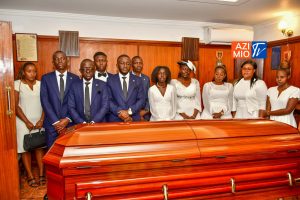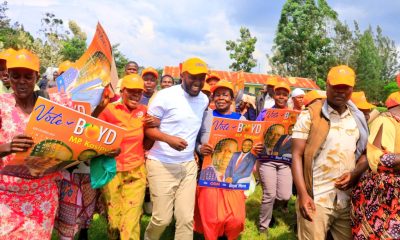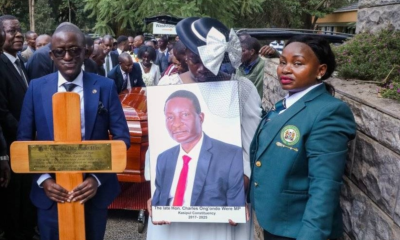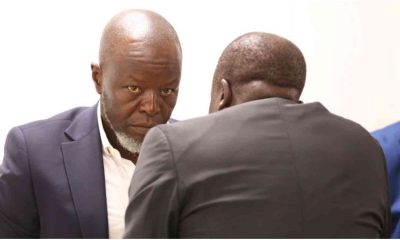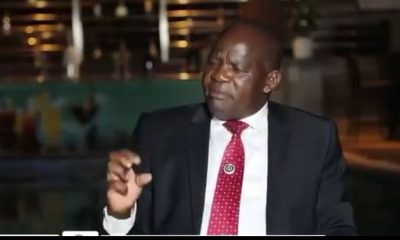Investigations
EXCLUSIVE: Mystery Caller Used Dead Woman’s Identity Days Before MP Were’s Assassination
The number was apparently created for the sole purpose of communicating with Were’s bodyguard, as no other calls were made from it.

A suspicious phone call made just hours before the assassination of Kasipul MP Charles Ong’ondo Were has become a central focus in the investigation, with detectives uncovering that the caller’s number was registered using the identity of a deceased woman from Nyanza region.
According to sources close to the investigation, the Directorate of Criminal Investigation (DCI) has zeroed in on a mysterious caller who contacted Were’s bodyguard on April 30 at approximately 2:40 PM—just five hours before the legislator was gunned down on Nairobi’s Ngong Road.
The call, which lasted one minute and ten seconds, was made to the MP’s aide who was at Parliament Buildings at the time.
This was not the first contact between the parties; investigators have confirmed that the same number had called the bodyguard two days earlier.
“We want to know who this caller was and what he wanted,” said an investigator familiar with the matter who spoke on condition of anonymity due to the sensitive nature of the ongoing probe.
In a troubling twist, forensic analysis has revealed that the phone number was registered just three days before the assassination using identification details of a woman from Nyanza who had been deceased for some time.
The number was apparently created for the sole purpose of communicating with Were’s bodyguard, as no other calls were made from it.
Both the bodyguard and the MP’s driver have since been arrested as part of the widening investigation.
Interior Cabinet Secretary Kipchumba Murkomen, while addressing journalists in Meru on Wednesday, acknowledged that individuals close to the MP were being questioned in connection with the murder.
“It involved people who should have ordinarily taken care of the interests of the Member of Parliament,” Murkomen stated.
“The government is committed to making sure that the perpetrators, some of whom have been arrested and others who will be arrested soon, are brought to book.”
The investigation has gathered momentum in recent days. On Tuesday night, DCI officers raided an apartment in Nairobi’s Chokaa area, recovering two pistols and nine bullets, as well as shoes matching those worn by a suspect captured on CCTV near where the MP was last seen alive.
DCI Director Mohammed Amin confirmed that the recovered weapons have been forwarded to ballistic experts to determine if they were used in the assassination.
Bullets recovered during Were’s post-mortem examination will be compared with the seized firearms.
Were was shot at close range by an assailant on a motorcycle at a traffic light on Ngong Road at approximately 7:30 PM on April 30, shortly after leaving Parliament.
Inspector General of Police Douglas Kanja has characterized the crime as “both targeted and predetermined.”
The assassination came after Were had publicly expressed fears for his life.
In a video that has circulated widely since his death, the MP had stated: “When you hear I have been killed, Kasipul will not be the same again. But I know they won’t kill me because I have the Bible in my phone and another one under my pillow.”
The killing has sent shockwaves through Kenya’s political establishment and raised questions about the safety of elected officials. It also follows a pattern of violence in Kasipul constituency, which has seen escalating tensions since 2019.
Just four days before Were’s assassination, West Kasipul MCA Vickins Bondo was brutally attacked by unknown armed men in Nairobi’s Lucky Summer area, sustaining head injuries.
Bondo is the son of Chief Inspector Nicholas Aguk Oballa, a police officer who died in February under mysterious circumstances in what was reported as a hit-and-run incident.
Investigations into both cases continue as authorities work to unravel what appears to be a complex web of violence targeting political figures from the Kasipul region.
Kenya Insights allows guest blogging, if you want to be published on Kenya’s most authoritative and accurate blog, have an expose, news TIPS, story angles, human interest stories, drop us an email on [email protected] or via Telegram
-

 Investigations1 week ago
Investigations1 week agoBillions Stolen, Millions Laundered: How Minnesota’s COVID Fraud Exposed Cracks in Somali Remittance Networks
-

 News1 week ago
News1 week agoUS Moves to Seize Luxury Kenya Properties in Sh39 Billion Covid Fraud Scandal
-

 Investigations1 week ago
Investigations1 week agoJulius Mwale Throws Contractor Under the Bus in Court Amid Mounting Pressure From Indebted Partners
-

 News1 week ago
News1 week agoMAINGA CLINGS TO POWER: Kenya Railways Boss Defies Tenure Expiry Amid Corruption Storm and Court Battles
-

 Americas1 week ago
Americas1 week agoUS Govt Audits Cases Of Somali US Citizens For Potential Denaturalization
-

 Americas3 days ago
Americas3 days agoTrump Says US Needs Greenland For Its National Security
-

 Sports2 days ago
Sports2 days agoThe Easy Way to MSport Ghana: From Login to Your First Bet
-

 Politics12 hours ago
Politics12 hours agoHow Ruto-Moi Deal Died After Temporary State House Ceasefire

